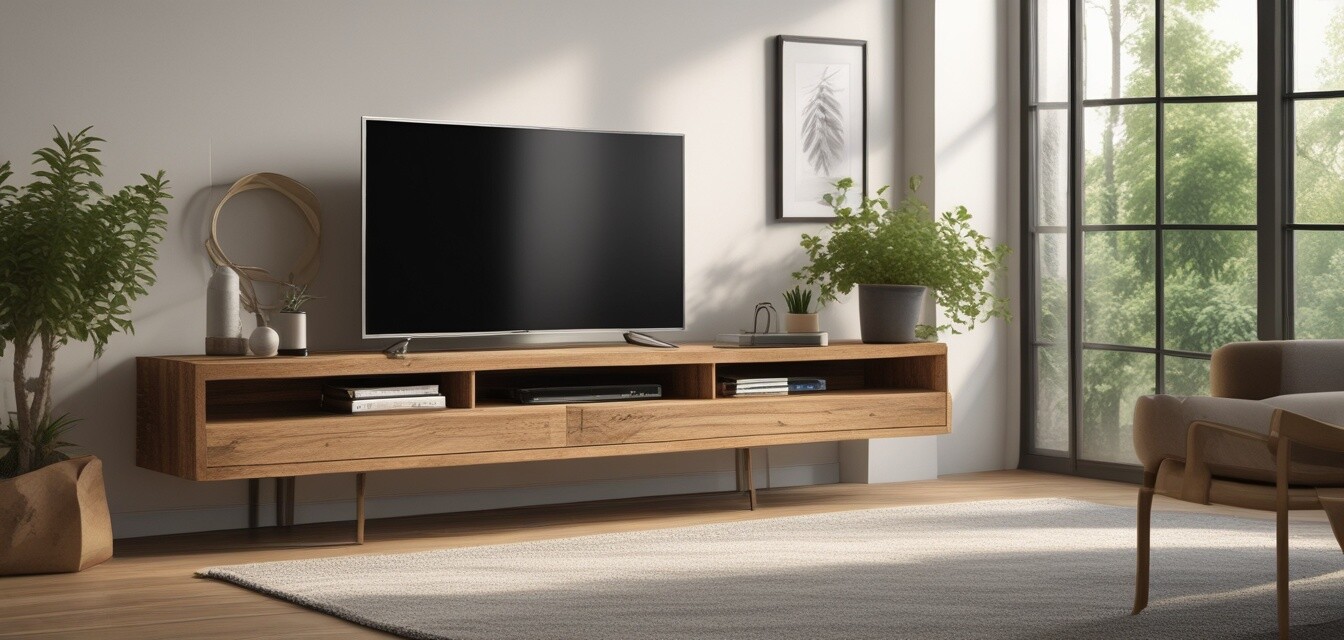
Sustainable furniture trends dominating 2025
Key Takeaways
- Rise in the use of recycled materials for furniture production.
- Emphasis on multifunctional designs for compact living.
- Increased demand for locally-sourced and handcrafted pieces.
- Simpler designs focusing on minimalism and sustainability.
- Growing popularity of rental services for sustainable furniture.
As we approach 2025, the landscape of sustainable furniture is evolving rapidly, with innovative trends that not only enhance home aesthetics but also prioritize the planet. In this article, we'll explore the major trends set to take center stage in sustainable furniture, particularly focusing on TV stand designs. From eco-friendly materials to multifunctional furniture, these trends reflect a growing commitment to sustainability in our everyday lives.
The shift towards sustainable materials
The use of materials that are sustainable, recycled, or reclaimed is becoming a defining characteristic of furniture design in 2025. Consumers are now actively seeking products that reduce their carbon footprint, and furniture manufacturers are responding accordingly. Below is a breakdown of trending materials:
| Material | Benefits | Examples of use |
|---|---|---|
| Recycled wood | Reduces waste and deforestation | TV stands, shelves |
| Bamboo | Fast-growing, renewable resource | Desks, cabinets |
| Recycled metals | Durable and sustainable | Frames, supports |
| Natural fibers | Biodegradable and renewable | Cushions, upholstery |
Multifunctional designs
As urban living spaces shrink, the need for multifunctional furniture has surged. Furniture pieces that serve more than one purpose—such as a TV stand that doubles as a storage unit—are set to become increasingly popular. Here are some key features driving this trend:
- Compact designs that maximize space.
- Adaptable configurations for changing living needs.
- Integrated storage solutions to keep clutter at bay.
- Stylish yet practical features like built-in charging stations.
Locally-sourced and handcrafted furniture
The growing awareness around sustainability has revived interest in locally-sourced and handcrafted furniture. By purchasing locally, consumers not only support their local economies but also significantly reduce transportation emissions. Characteristics of this trend include:
- Unique, one-of-a-kind pieces that tell a story.
- Support for artisans and small furniture makers.
- Eco-friendly practices in production.
- Use of natural finishes that highlight the material's beauty.
Minimalistic designs
The minimalistic approach is all about reducing excess while emphasizing functionality. In 2025, consumers are expected to prefer furniture that is sleek, simple, and devoid of unnecessary adornments. Key elements include:
- Clean lines and neutral colors.
- Focus on structural beauty.
- Durable construction with a lasting appeal.
- Prioritizing quality over quantity.
Rental services on the rise
With the increasing awareness surrounding sustainability, the furniture rental market is gaining traction. Renting allows consumers to enjoy quality, sustainable furniture without committing to a purchase. This trend is characterized by:
- Access to high-quality sustainable pieces.
- No long-term commitment, allowing for easy upgrades.
- A cost-effective solution for temporary living situations.
- Reduced waste from continuous purchasing.
Pros
- Enhances eco-friendly living by reducing waste.
- Supports local economies and artisans.
- Offers flexibility in urban living spaces.
- Adds aesthetic value with unique designs.
Cons
- Some sustainable options can be more expensive upfront.
- Quality may vary among handcrafted pieces.
- The durability of low-impact materials can sometimes be questioned.
Conclusion
As we embrace 2025, sustainable furniture trends are no longer just a niche; they are becoming essential in how we furnish our homes. The shift towards eco-friendly materials, multifunctional designs, local craftsmanship, minimalism, and rental options reflects a growing awareness among consumers about the importance of sustainability. For those looking to explore more options and ideas about sustainable furniture, check out our guides on corner TV stands, entertainment consoles, and buying guides. Let’s create a greener future, one TV stand at a time!